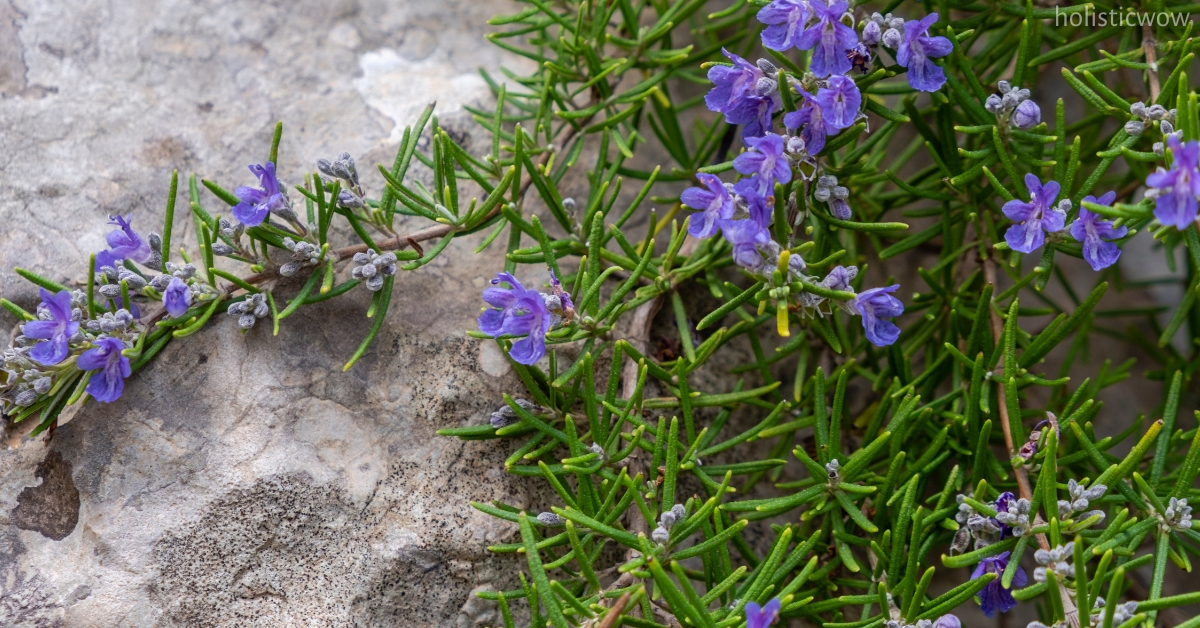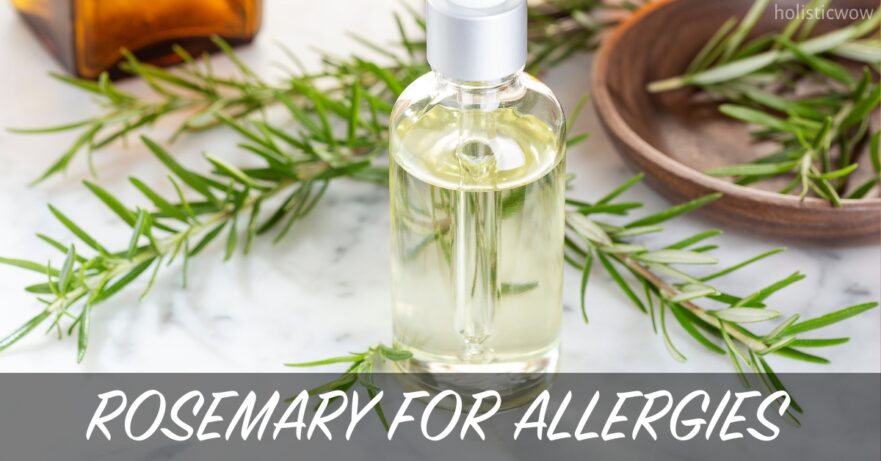Should You Consider Rosemary for Natural Allergy Relief?
Research suggests that rosemary extract may help inhibit allergic processes by modulating immune responses, particularly its effects on mast cell activation.
This points to potential benefits for allergy relief.
While rosemary shows promise due to its therapeutic properties and ability to support immune modulation, experts emphasize that it should not yet be considered a definitive treatment for preventing allergies.
Studies indicate that compounds in rosemary, such as rosmarinic acid, carnosic acid, and carnosol, may reduce inflammation and allergic reactions in preclinical models, but more well-controlled human clinical research is needed to confirm these effects.
Therefore, while exploring natural remedies like rosemary extract, it’s important to consult with healthcare professionals and continue using established allergy treatments.
Rosemary may serve as a supportive option for allergy relief, but it should be used cautiously and not as a substitute for medical treatment until further evidence supports its clinical effectiveness.
Key Takeaways
- 🌿 Potential Allergy Relief: Rosemary extract may help reduce allergic reactions by modulating immune responses and inhibiting mast cell activation, but more human studies are needed to establish its effectiveness.
- 🧪 Key Compounds: Compounds in rosemary, such as rosmarinic acid and carnosic acid, show promise in reducing inflammation and allergic symptoms, though their effects are mostly observed in preclinical studies.
- 🚫 Caution Advised: Rosemary should not replace conventional allergy treatments, and individuals should consult healthcare providers before using it, especially if pregnant or allergic to plants in the mint family.
- 🍵 Herbal Preparations: Rosemary infusions and herbal blends may offer complementary support for allergy management, but they should be used alongside established treatments and under medical guidance.
What Are the Benefits of Using Rosemary for Allergies?
Rosemary extract offers several potential benefits for managing allergies:
- It may modulate mast cell activation, which may help reduce the release of histamine and other chemicals that trigger allergic symptoms.
- It may decrease the production of pro-inflammatory mediators, potentially easing symptoms like sneezing and nasal congestion.
- It may help alleviate inflammation associated with allergic reactions by influencing key signaling pathways involved in immune responses.
- It may modulate the activity of certain immune cells, potentially contributing to reduced congestion and milder allergic symptoms.
- It contains antioxidants, which may help neutralize free radicals and further support the reduction of inflammation linked to allergies.
These effects are largely attributed to bioactive compounds in rosemary extract, such as rosmarinic acid, carnosic acid, and carnosol, which have been shown in animal and cell-based studies to support immune balance and reduce allergic inflammation.

What Components in Rosemary Help with Allergy Relief?
Key components in rosemary that may help with allergy relief include carnosic acid and carnosol.
These compounds have been shown to inhibit the activation of specific kinases involved in mast cell signaling, such as Syk and TAK1, and reduce the activity of the NF-κB transcription factor pathway, which are important in mast cell activation and allergic inflammation .
By interfering with these signaling pathways, carnosic acid and carnosol could potentially reduce the release of inflammatory substances from mast cells, which may help ease allergic responses.
How Does Rosemary Extract Inhibit Allergic Reactions?
Rosemary extract may help inhibit allergic reactions by reducing the degranulation of mast cells.
Degranulation is the process of mast cells releasing inflammatory molecules in response to allergens, triggering allergy symptoms.
Research suggests that rosemary extract interferes with key signaling pathways in mast cells, which helps limit the release of cytokines and chemokines —proteins involved in immune system communication.
By disrupting these immune signaling pathways, rosemary extract may reduce early and late-phase allergic responses, potentially easing inflammation and other common allergy symptoms.
These effects are thought to be due in part to active compounds in rosemary, such as carnosic acid and rosmarinic acid, which have demonstrated anti-inflammatory and antioxidant properties in preclinical studies.
How Can Rosemary’s Antioxidant Properties Benefit Allergy Sufferers?
Rosemary’s antioxidant properties may benefit allergy sufferers by helping neutralize free radicals, which are unstable molecules that can contribute to inflammation.
By reducing oxidative stress in the body, rosemary may help ease inflammation linked to allergic responses.
This effect could potentially contribute to the alleviation of common allergy symptoms like nasal congestion and sneezing.
Rosemary contains rosmarinic acid, a compound known for its anti-inflammatory and antioxidant effects.
Research suggests that rosmarinic acid may help suppress the activity of inflammatory white blood cells and reduce allergic antibody responses.
These properties may help reduce the severity of seasonal allergy symptoms by calming the body’s inflammatory response.
Additionally, rosemary extract has been shown in preclinical studies to inhibit mast cell activation, which plays a key role in triggering allergic reactions.
Can Rosemary Help with Asthma Symptoms?
Rosemary may help alleviate asthma symptoms due to its anti-inflammatory and antioxidant properties.
Research suggests that rosemary extract can reduce allergic inflammation in respiratory tissues by modulating immune cell activity, particularly mast cells, which play a key role in respiratory allergies.
Rosmarinic acid, a key component in rosemary, plays a significant role by suppressing inflammatory responses in the respiratory tract.
This compound has been shown to reduce the release of inflammatory mediators and may help ease symptoms associated with asthma and other allergic conditions in animal models.
Though it is not a substitute for conventional treatments, these anti-inflammatory effects may make rosemary a supportive option for managing asthma symptoms.
While promising, rosemary and its components, like rosmarinic acid, should be considered complementary therapies pending further human research.
Always consult healthcare professionals before using herbal remedies for asthma management.


What Are the Potential Side Effects of Using Rosemary for Allergies?
Potential side effects of using rosemary for allergies may include:
- allergic reactions,
- gastrointestinal upset,
- interactions with certain medications.
Individuals allergic to rosemary or other plants in the mint family (Lamiaceae) should avoid its use, as it could trigger hypersensitivity reactions.
Although rosemary extract and its compounds, such as rosmarinic acid, have shown potential in reducing allergic inflammation in animal models, it’s important to monitor for any adverse reactions when starting rosemary supplementation.
Pregnant and nursing women should avoid rosemary supplements due to potential risks, as high doses may stimulate uterine contractions or affect hormone levels.
While culinary use is considered safe, concentrated extracts and supplements should be used with medical guidance.
Herbal Preparations and Recipes for Allergy Relief
Herbal remedies can provide complementary support for managing allergy symptoms. Rosemary, known for its anti-inflammatory and antioxidant properties, may help modulate immune responses and reduce inflammatory mediators, potentially alleviating symptoms associated with allergies.
The following recipes utilize rosemary and other herbs traditionally used for allergy support. Always consult a healthcare provider before starting any new herbal regimen, especially if you have existing health conditions or are taking medications.
Rosemary Infusion for Allergy Relief
Ingredients:
- 1 teaspoon dried rosemary leaves
- 1 cup of boiling water
Preparation:
- Place the dried rosemary leaves in a teapot or heatproof container.
- Pour boiling water over the rosemary.
- Cover and steep for 10–15 minutes.
- Strain and drink 1–2 cups daily.
This infusion harnesses the properties of rosemary to help reduce oxidative stress and inflammation, potentially offering respiratory support during allergy season.
Warnings: Avoid rosemary during pregnancy, as it may stimulate uterine contractions. Individuals allergic to rosemary or plants in the mint family (Lamiaceae) should not use this remedy. Rosemary may interact with medications such as anticoagulants, diuretics, or drugs that affect blood pressure—consult your healthcare provider first.
Herbal Allergy Relief Blend
Ingredients:
- ½ teaspoon dried rosemary leaves
- ½ teaspoon dried nettle leaf
- ½ teaspoon dried peppermint leaves
- ½ teaspoon dried mullein leaf
- 1 cup of boiling water
Preparation:
- Combine all the dried herbs in a teapot.
- Add boiling water and steep for 10–15 minutes.
- Strain and drink 1 cup 2–3 times daily.
This blend combines rosemary and nettle’s anti-inflammatory effects with peppermint’s decongestant effects. Adding mullein may provide additional soothing benefits for the respiratory tract.
These herbal preparations aim to support your body’s natural defenses against allergies. However, they should not replace conventional medical treatments. Always consult a healthcare provider before starting any new herbal regimen, particularly if you have existing health conditions or are taking medications.

